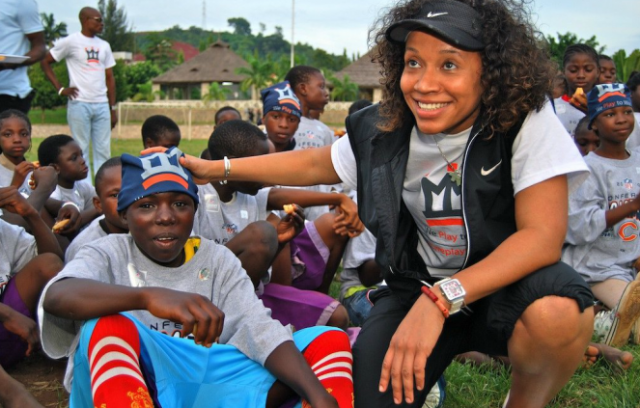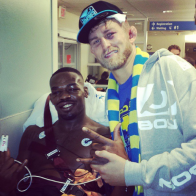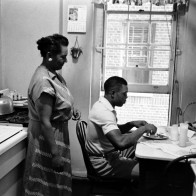
Nigerian footballer and President of We Play to Win Kasia Muoto is highly motivated. Driven by her idea to bring access to sporting programs and equipment to some the most lively yet economically exploited area in the world, Kasia’s mission will eventually breed self-determined young women who are ready to take on the leadership role in their respective communities.
Last year, Frugivore’s Arielle Loren featured Muoto’s foundation and her uplifting women’s athletics manifesto, giving readers nine facts for the inclusion and expansion of full-scale women’s athletics programs, from raising self-esteem to decreasing the levels of traumatic or violent experiences.
Recently, African Sports Monthly caught up with the Los Angeles-based philanthropist, asking Kasia to expound on what she plans to accomplish with We Play to Win in 2012 and why her fight to bring sports to impoverished areas should be a top priority for donors, activists, and anyone who cares about the human condition.
Check out some excerpts from the interview:
ASM: Can you tell us about ‘We Play to Win’, sort of give us a brief description of what your organization is all about?
Kasia: Absolutely. We Play to Win is an organization that leverages the appeal and power of sports to create social change in impoverished communities, with a focus on the younger women in these communities. We are able to interact with a good number of young people (usually 60-80 at a time) and engage them through sports, play and physical activities, behavioral modeling, question-and-answer sessions, and dialogue about their past or current situations, depending on what we learn about them or what they share with us. Using sports as our medium, we can do all of this “work” in a fun and non-threatening environment – something many of them are not used to given how hard their circumstances are.
ASM: In what areas of the world does the organization execute its mission?
Kasia: Currently, We Play to Win focuses on impoverished communities in Africa – we have done programs in Nigeria, Ghana and Liberia, and plan to return to each of those countries.
ASM: You mentioned that you have executed most of your programs in Nigeria. Can you give us an insight to your programs in Nigeria, as well as those in Liberia and Ghana – and some of what is taught?
Kasia: Yes, so far Nigeria has seen us the most given my roots there. We have spent time delivering the ‘We Play, She Plays’ program to young women there, and have also delivered Youth Empowerment through Song and Sport (YESS) to both guys and girls … Liberia was very unique given their history of war … One has to really do their due diligence beforehand because although sports is universally loved and known to be a powerful catalyst, it does not necessarily facilitate things the same way or at the same rate for every community.
ASM: You are so passionate about the whole concept of using sports as a conduit for change. I know you used to be an athlete as well. What gives you your drive about this mission?
Kasia: Its a long story, but as many know I had a brush with the polio epidemic as an infant, which you would never know by just looking at me … I somehow contracted polio and was unable to crawl, stand or walk for close to two years after birth … my parents ensured that I took daily walks and spent time on foot coordination and stretching exercises. It was also at this time that my immediate older brother, Martin, would take a soccer ball into the yard daily, practicing to be the next Pelé.
He always wanted someone to play with; that was me. He took the time to teach me how to dribble and shoot so that I would be more of a challenge, as we played one-on-one. We would also race each other in the yard, and compete in sit-ups, push-ups and lifting random heavy objects. Some might call it play, sibling bonding or sibling rivalry, but in hindsight I realize that it was so much more! Using sports at such an early and fragile part in my life, my brother Martin was empowering and rehabilitating me while serving as my therapist, coach, trainer, leader and encourager.

ASM: What are some of the impacts We Play to Win’s programs have had? Or, what have been some of the reactions –not just from the kids, but also from the adults (whether athletes, partners or volunteers)?
Kasia: Let’s talk about the younger people first. When a young person has been told or led to believe that they are good for nothing, or when they have been severely neglected, abandoned or abused in some way, due to ignorance, conflict or poverty – they come to believe they are very insignificant and perhaps even valueless. On the continent, this happens a lot more to girls and women; really, it should happen to anyone. It is a very low place for anyone to be mentally and emotionally. Yet, having someone affirm you in person, give you attention and tell you that you are valuable, and that you are a child of hope, potential and promise, is HUGE for an individual who has been broken.
Nevertheless, it’s amazing how the act of using sports to affirm, empower and enlighten others, goes such a long way. It has the same effect of pouring water on a struggling or dying plant. We work directly with on-the-ground partners who have kept me apprised of the mood, spirit and activities of many of these girls (and boys) after we have delivered these programs. And it is these partners we look to, to help us keep watering these “plants.”
There is also a transformation that occurs in us adults – both athletes and volunteers – who deliver these programs. Even though we are physically and emotionally worn at the end of the day — you can see that our joy is renewed and our cup is so filled. What we are able to do using sports, heightens our appreciation for each other and for God’s grace over our lives. With every trip, we not only get closer to each other but we also realize how minuscule most of our problems are on the other side of the ocean, relative to the weight on the shoulders and in the hearts of these youth.
ASM: This sounds exciting, not just exciting, but inspirational. So what impact do you think you have on or in Africa overall?
Kasia: I believe when you affirm, inspire, empower, teach and develop people as we do through sports, it results in individuals who are more informed and enlightened, more aware, more secure, more confident, more capable, enabled and willing to try things and to progress. This is because through the appeal of sports they have seen and been taught that conflicts can be settled peacefully; that all men and women are created equal; that tolerance must be practiced regardless of gender, race or creed; that there is way to do things with honesty and integrity. So, as they grow up one will find that those who had these interactions become more effective contributors and leaders in their communities, and because others “helped them along the way,” they are more apt to be agents of change for others.






